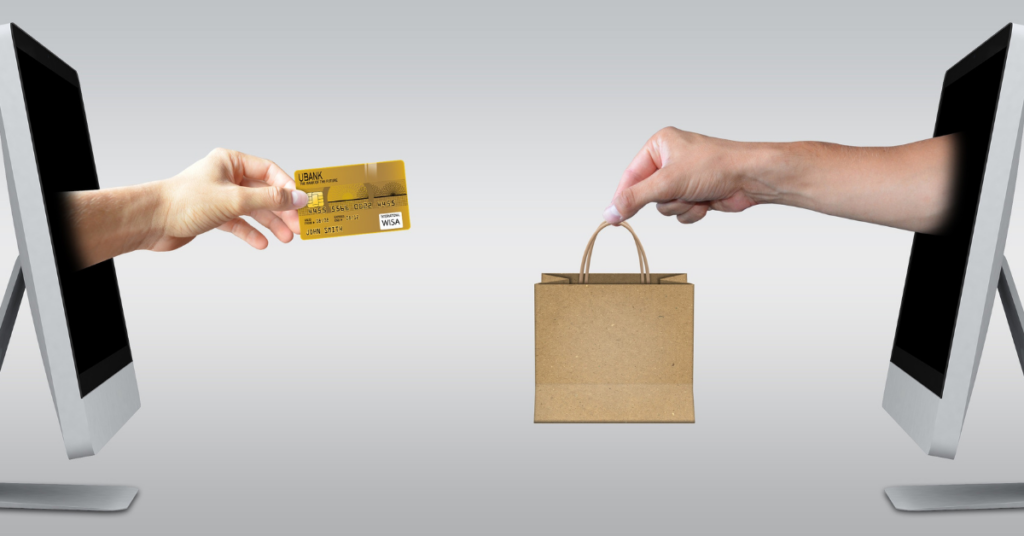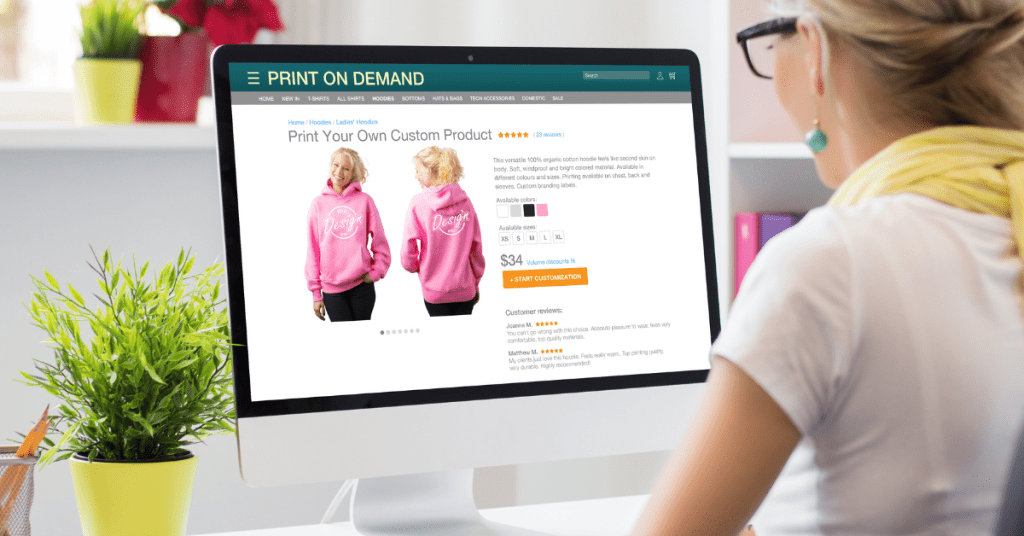Starting a print-on-demand business online is good. You don’t need to hold your inventory before validating the product. With print-on-demand, you just create your design and upload it to your supplier platform. Your supplier will only print the product when someone buys from you. You can build your business on Shopify vs. Etsy. But which is better?
There are plenty of marketplace and eCommerce store builders out there. But choosing the right platform to start your eCommerce business is the first step to building your successful business.
For today, we will be comparing the two popular platforms Shopify vs Etsy. Both these platforms are good at what they are doing. So, keep reading and see which is more suitable for you.
Shopify Overview
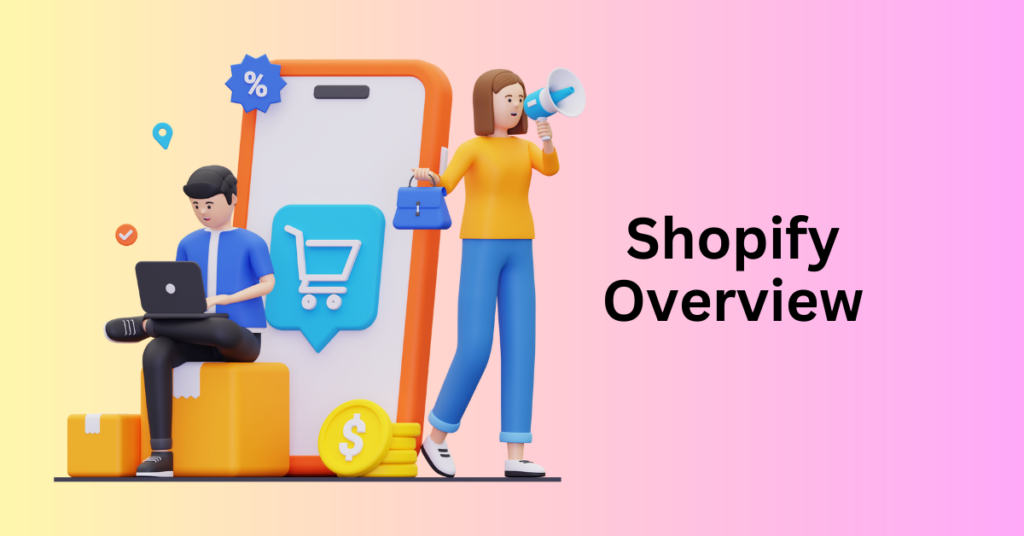
Shopify is a leading e-commerce platform that empowers businesses of all sizes to create and manage their own online stores. Launched in 2006, Shopify has grown to become one of the most popular and user-friendly solutions for selling products and services online.
It provides a comprehensive suite of tools and features that cater to entrepreneurs, small businesses, and even established enterprises looking to establish a powerful online presence.
Store Creation and Design
One of Shopify’s standout features is its ease of use in creating an online store. You can choose from a wide range of customizable templates to design a visually appealing and functional website.
The platform offers a drag-and-drop interface that requires no coding skills. Hence, making it accessible to individuals with varying levels of technical expertise.
Product Management
Shopify simplifies product management by allowing sellers to effortlessly add, categorize, and organize their products. Furthermore, it supports a variety of product types, variations, and pricing options.
The platform also offers inventory tracking, which helps you to keep track of your stock levels and manage orders effectively.
Payment and Checkout
Shopify offers a seamless and secure payment processing system that supports a wide array of payment gateways. This ensures that customers can make purchases using their preferred payment methods.
Additionally, Shopify’s checkout process is designed to minimize cart abandonment and enhance user experience, leading to higher conversion rates.
Sales Channels
Beyond traditional online stores, Shopify offers multi-channel selling capabilities. You can easily expand your reach by selling products on social media platforms, marketplaces like Amazon and eBay, and even through physical point-of-sale systems.
This omnichannel approach enables businesses to engage with customers wherever they are.
Marketing and SEO
Shopify provides various built-in marketing tools to help you optimize your stores for search engines (SEO), create discount codes, run promotions, and integrate with email marketing services.
This helps businesses attract and retain customers while boosting their online visibility.
Analytics and Reports
Shopify offers robust analytics and reporting features that provide insights into store performance, sales trends, customer behaviour, and more. This data empowers you to make informed decisions and refine your strategies to drive growth.
App Store and Customization
Shopify’s App Store is a third-party application store that extends the platform’s capabilities. From advanced marketing tools to specialized inventory management apps, you can enhance your stores with features tailored to your unique needs.
Security and Support
Shopify places a strong emphasis on security, with features like SSL certificates and PCI compliance to safeguard customer data. Additionally, the platform offers 24/7 customer support via various channels, ensuring that users can get assistance whenever they need it.
Shopify’s user-friendly interface, extensive features, and scalability have made it a go-to choice to establish, grow, and manage your online stores.
Whether you’re a solopreneur, a small business, or a larger enterprise, Shopify provides a comprehensive ecosystem to navigate the world of e-commerce with confidence.
Get Started With Shopify Free Trial Today
Etsy Overview
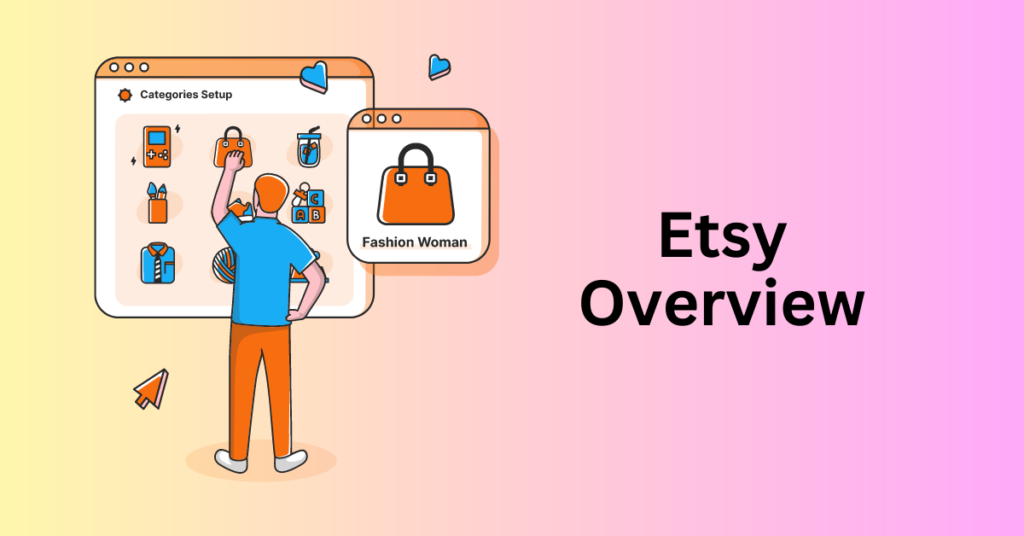
Etsy is a well-known online marketplace that connects buyers and sellers. Furthermore, it offers a platform for artisans, crafters, vintage sellers, and unique product creators to showcase and sell their goods.
Founded in 2005, Etsy has become a hub for people looking for handcrafted, vintage, and one-of-a-kind items that often can’t be found in traditional retail stores.
Handmade and Vintage Goods
Etsy is distinctively focused on handmade and vintage items. Sellers on Etsy offer a wide range of products. This includes handmade jewellery, clothing, home decor, artwork, vintage clothing and accessories, and more.
This niche focus sets Etsy apart from other online marketplaces by providing a platform where sellers can showcase their artistic and creative talents.
Seller Community
Etsy has nurtured a strong sense of community among its sellers. It’s a platform where creators can tell the stories behind their products, share their artistic processes, and interact with buyers.
This personal touch appeals to customers who value the backstory of the items they purchase.
Shop Customization
Etsy allows sellers to set up their online shops with unique branding and customization. Furthermore, sellers can create shop banners, profile descriptions, and policies that reflect their brand identity and values.
This level of customization helps sellers stand out and establish their unique online presence.
Ease of Use
Setting up an Etsy shop is relatively straightforward, making it accessible for individuals who might not have extensive technical skills.
Sellers can easily list products, set prices, and manage their inventory through the platform’s user-friendly interface.
Search and Discovery
Etsy offers a powerful search and discovery mechanism that helps buyers find products that match their interests. The platform’s algorithms consider factors such as keywords, product categories, and past behaviour to provide tailored recommendations to shoppers.
Reviews and Ratings
Etsy places a significant emphasis on reviews and ratings. This feature allows buyers to leave feedback about their purchases. This will help to establish trust and credibility within the community.
Positive reviews can contribute to a seller’s reputation and attract more customers.
Mobile App
Etsy offers a mobile app that enables both buyers and sellers to engage with the platform on the go. Sellers can manage their shops, communicate with customers, and even list products directly from their mobile devices.
Global Reach
Etsy’s international reach allows sellers to connect with buyers from around the world. This is particularly beneficial for unique or niche products that may find a dedicated audience in various geographic locations.
Fees and Payments
Etsy charges sellers listing fees for their products and takes a percentage of each sale. These fees help support the platform’s infrastructure, marketing efforts, and customer support.
In summary, Etsy is a thriving online marketplace that specializes in handmade, vintage, and unique products. Its focus on community, customization, and creative expression makes it a go-to platform for both buyers seeking distinctive items and sellers looking to share their artistic creations with a global audience.
Which is Better for You? Shopify vs. Etsy
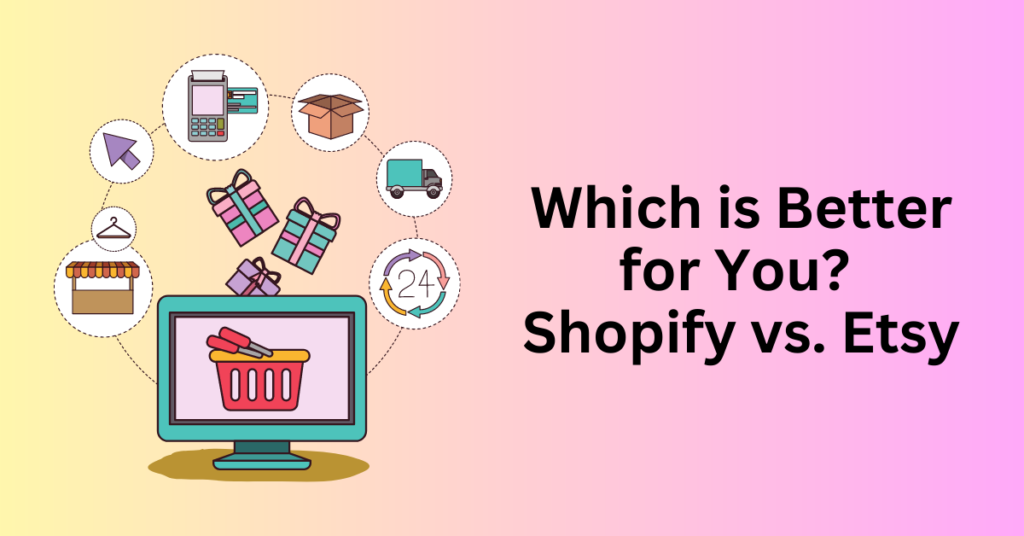
Both Shopify and Etsy have their advantages and disadvantages when it comes to starting a print-on-demand store. There is no right or wrong for which platform you choose to start your online store.
However, knowing that it is a tough choice between both platforms and in most cases, you might not be able to start both at the same time, we will summarize the differences between both platforms so you can make a better choice to start.
First of all, both sales channels are great for new sellers. It offers the simplicity to create and build your first print-on-demand store online.
A Print-on-Demand (POD) store is an online shop where you can offer custom-designed products like t-shirts, mugs, and posters without holding any inventory. When a customer orders a product with a specific design, the POD platform arranges for the product to be made and shipped directly to the customer.
This model eliminates the need for upfront investment and storage costs, making it accessible for individuals and businesses to sell personalized items with lower risk. It’s a flexible way to create and sell products without the hassle of manufacturing and managing stock.
1. Shopify vs. Etsy: Products
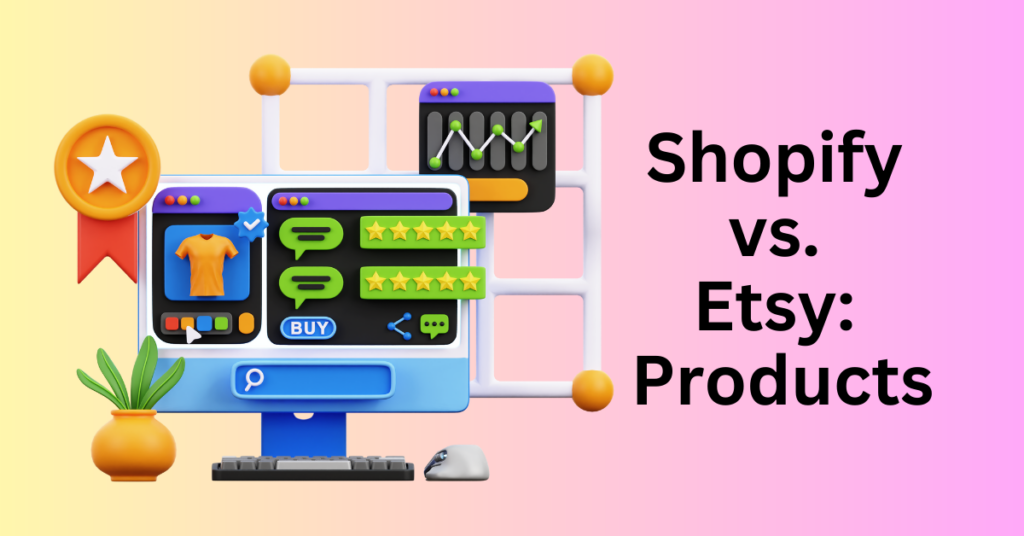
As mentioned in the overview, Etsy is a marketplace that focuses on handcrafted goods, vintage items, and craft supplies. Hence, you will need to first decide on your product type that suits the platform before opening your shop. Since you are selling on the print-on-demand model, custom shirts, mugs, and stickers are all good for Etsy.
Shopify, on the other hand, is an eCommerce store builder platform. This means you can build your eCommerce store and sell almost anything you want as long as it’s legal. There is no limitation as you own the store and you control the rules in the store.
Just be very careful that never go beyond the law. Anything you do must follow the law.
Etsy is a good marketplace to sell your products too. But in this round, Shopify is a clear winner as it provides you different range of products that you can sell.
2. Shopify vs. Etsy: Ease to Setup
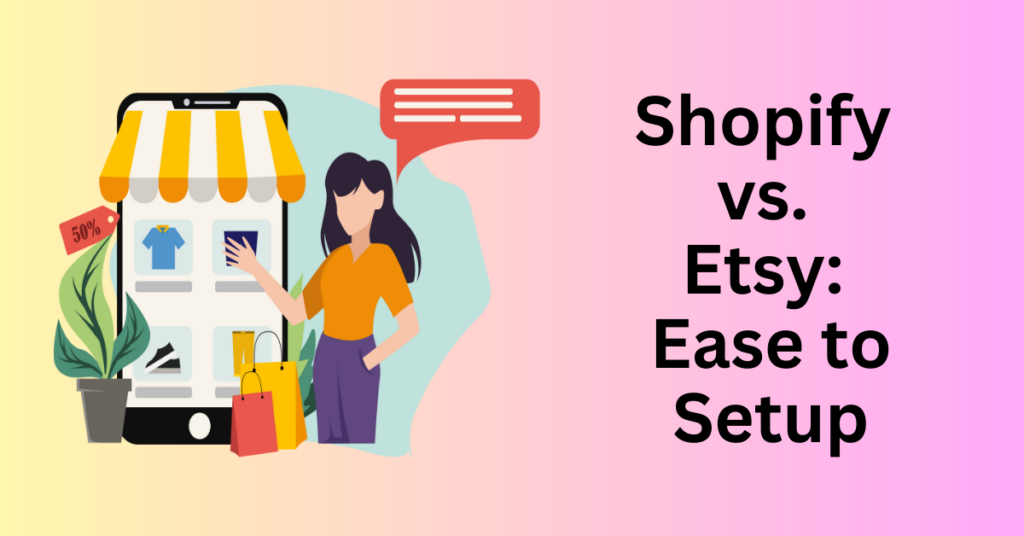
Both Shopify and Etsy are very user-friendly. Anyone who knows how to use a computer should be able to follow the guide to set up their store easily. They took away the tedious work and simplified the eCommerce store-building process so anyone can start easily.
Shopify emerges as an all-in-one eCommerce builder that provides a simple dashboard that you can follow to build your stores. You can start designing your store with the pre-built theme and different modules for product management, payment gateway, inventory and order tracking, promotions and others. All are within the reach of a few clicks.
Etsy on the other hand, is even more easier. Etsy is a marketplace where you can open your store on the marketplace and list your products. You can list your products by uploading the product to the dashboard and completing all the required information. Then, it will appear on your Etsy store.
You will get your store where you can make some minor changes to include your store banner, announcement, product categories and the background of your business. But your product will also appear on the search result when someone is searching on Etsy.
Both Shopify and Etsy are good in this part as both provide the simplicity to start your eCommerce store without huge efforts. It all depends on how you want your eCommerce store to run. If you want to have your website, Shopify is the best. And if you want to start quickly and sell on a marketplace, Etsy will be the right choice.
There is no right or wrong for the platform selection. You can choose one of them to start or work on both platforms too.
3. Shopify vs. Etsy: Design and Layout
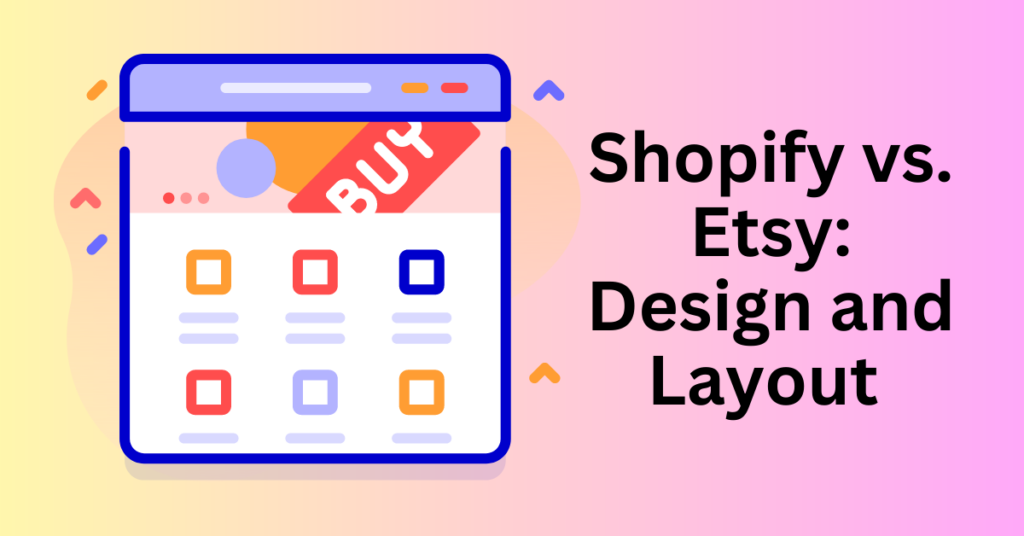
Every single element in your eCommerce store can help generate sales when designed properly. An attractive and compelling store will help to get people to buy more from you.
For Etsy, there is limited customization you can do to your store and the product sales page. As an eCommerce platform, Etsy keeps all the product pages the same to keep it consistent across all sellers. All you can do is use compelling product photographs and videos.
Also, for your Etsy store page, you can customize your store banner, logo, title, feature listings, announcement and store background. The layout is fixed, and you can only customize the content.
Whereas for Shopify, you can customize the entire eCommerce store website. While there are some pages like the checkout page, which is not customizable as it would need to comply with certain legal requirements, you can customize other pages. This includes the homepage, product page, category page and others.
To start customising your Shopify store, Shopify offers free and paid themes for you to start using for your Shopify store. And you can start with the free theme to build your successful eCommerce store. The paid theme is good, but you can use it later when your Shopify store is successful.
In short, Etsy provides a standard eCommerce store for all its sellers. The layout is tested and proven to work by Etsy sellers. Shopify on the other hand, let you customize your own eCommerce store by your own. You can add different sections and elements to your Shopify store to create a customized look and feel to optimize your sales process.
4. Shopify vs. Etsy: eCommerce Tools
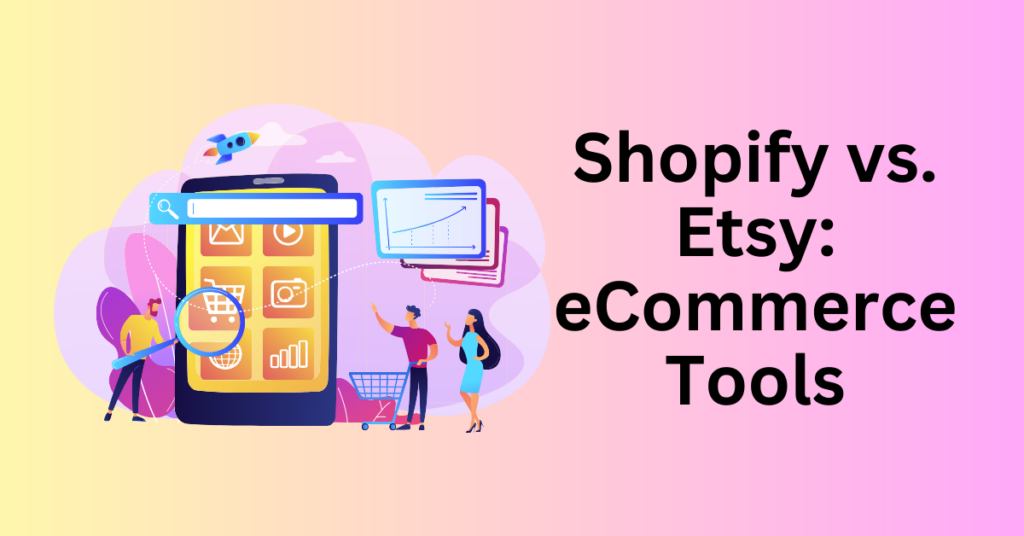
For your eCommerce store, you will need different tools like analytics, marketing, and promotions to run it effectively.
Etsy provides the basic analytic tool for you to check the statistics of your Etsy store, and manage your inventory and customer communications.
And for Shopify, it’s done through Shopify apps. Shopify app store consists of different apps ranging from marketing, and analytics to order tracking.
While both Shopify and Etsy can provide additional eCommerce features to run your eCommerce store effectively, the wide range of apps available in the Shopify app store allows you to add more features to your Shopify store.
5. Shopify vs. Etsy: SEO
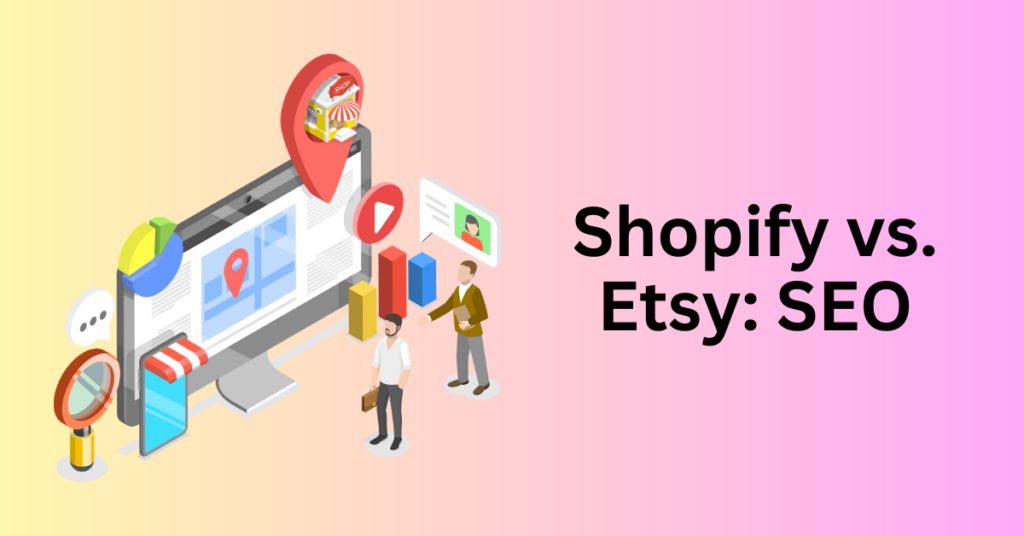
Search Engine Optimization (SEO) is the marketing strategy used to increase the ranking so that your store and products are more discoverable in the search results.
For Etsy, you can optimize your product listings based on Etsy SEO requirements to rank your product higher on the Etsy marketplace. Etsy has over 89.9 million active buyers who are searching on the marketplace to buy something. If your product can rank on the first page of the search results organically, you will get sales from it easily.
Shopify on the other hand, is running on different strategies. For the Shopify store, you can build your content marketing through a blog feature. Shopify allows you to create a blog as part of your eCommerce store.
You can optimize your blog posts based on the highly searched keywords on the search engine to get more visibility. And once it’s ranked, you will get free organic traffic to your store and sales page.
SEO is a long-term traffic strategy for your eCommerce store. You can get lots of free organic traffic if it’s done properly. However, both Etsy and Shopify are using a different approach. Etsy focuses on optimizing your product listings to rank higher on Etsy marketplace search results. Shopify focuses on content marketing to rank higher on the search engine result page.
6. Shopify vs. Etsy: Pricing
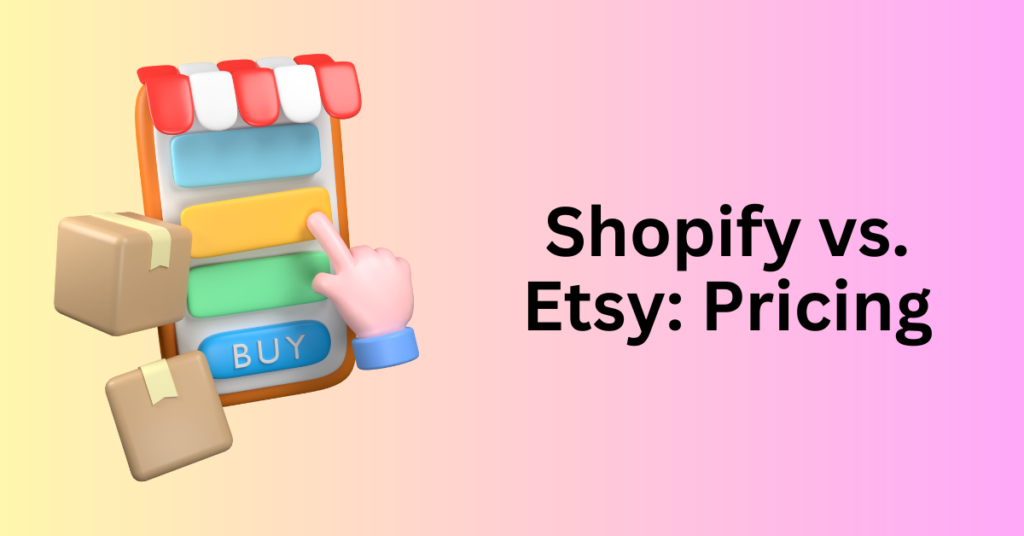
Shopify offers a flat rate monthly subscription that includes the usage of the platform to build your eCommerce store and a transaction fee to process your orders. The latest trial plan offers a 3-day free trial with another 3 months for $1 each. It might seem like a short trial period, but the $1 is the commitment for yourself to start the business.
Get Started with Shopify Free Trial
Shopify Pricing Plan
If you are getting it for free, you will not appreciate it and focus on it. That’s the mindset change. Shopify offers three different plans.
- Basic Shopify: $25 per month, 2% transaction fee, two staff accounts, 24/7 support and blogging capacities.
- Shopify: $65 per month.,1% transaction fee. 5 staff accounts and professional reports, plus bonuses for POS and gift cards.
- Advanced Shopify: $399 per month, 1% transaction fee. 15 staff accounts, report builder upgrade, plus reduced logistical costs with third-party calculated shipping.
These are the basic cost and you might have some additional costs if you opt for premium apps or themes.
Etsy Pricing Plan
Etsy on the other hand, does not charge a monthly subscription fee to sell on its marketplace. However, there are some listing fees and transaction fees to sell on its platform.
- Subscription fee: Free or $10/month for Etsy Plus.
- Listing fee: 20 cents per listing plus 20 cents per sale (renewal fee).
- Transaction fee: 6.5% total cost of each transaction.
- Payment processing fee: 3% + $0.25
Shopify subscription fee model will provide a significantly higher upfront cost, You will need to pay to run your eCommerce store no matter whether are you getting sales or not. Etsy on the other hand only incur costs when your product is listed and being sold.
It is good to start on Etsy when your sales volume is lower. But when your business grows, you want to have your own Shopify store as you are going to save a lot in transaction fees.
7. Shopify vs. Etsy: Analytics
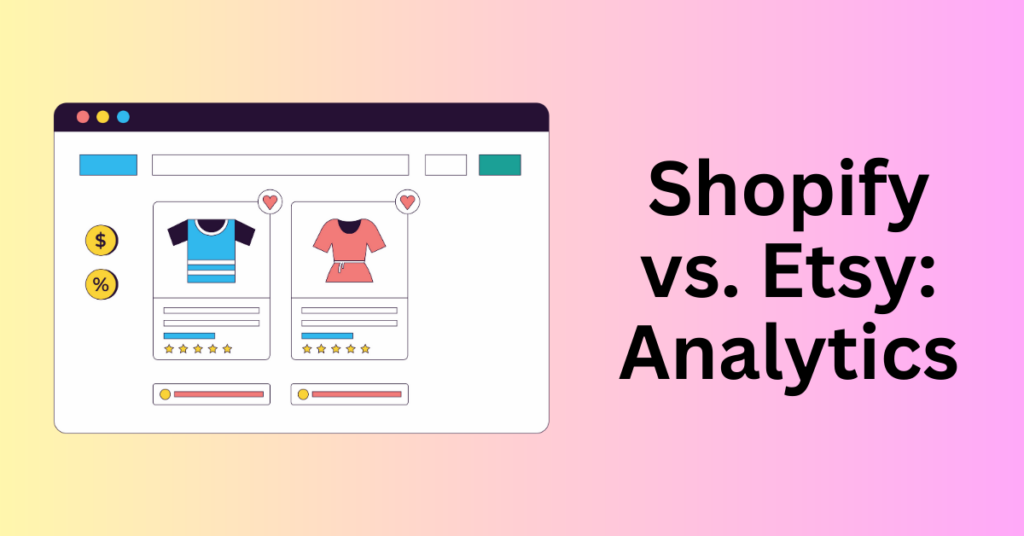
Data analytics helps you to make better decisions. Both Shopify and Etsy provide reporting on your store data.
Shopify’s reporting will provide you with all the basic information like view counts, purchase rates, revenue and so on. Besides, you can also add different other analytics parameters like Google Analytics through app integration.
For Etsy, it is a simple report where you can see your traffic, customer visits, view rate for each product, revenue and product listings. Furthermore, it is very easy for you to know which product has having higher click rate and conversion rate.
Shopify is the clear winner here if you are looking for a more comprehensive report. But if you would keep it simple, Etsy will still do the work.
8. Shopify vs. Etsy: Marketing Tools
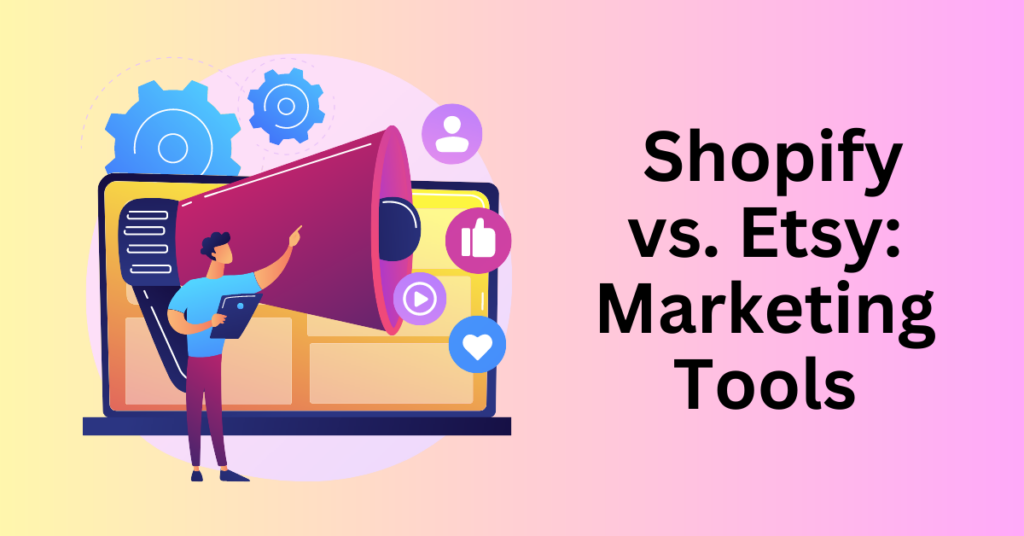
Your eCommerce store will not be discovered if you don’t promote it. There are a lot of different ways you can do marketing for your eCommerce store. SEO marketing, social media marketing, email marketing, content marketing, influencer marketing and others.
For Shopify, there are a lot of different custom apps built for different marketing requirements. For example, you can integrate your email autoresponder with Shopify so that all your customers or leads generated from your Shopify store can be added to your email list automatically. This is so that you can send out different marketing emails or newsletters to nurture them.
Not only that, you can also use the app to create your social media posts and ads for your products easily from your Shopify dashboard. And instantly, it will be published on your social media profile.
For Etsy, it’s a different approach. Instead of integrating with different platforms and apps, it does provide you the option to advertise directly using Etsy ads. When your product is listed for Etsy ads, it will be shown for the keywords search result when someone searches.
The Etsy ads are run with budget optimization for your listings to perform best. Not only that, but Etsy does also advertise your products on different platforms they are buying ads from. And you are not going to pay for the ad cost if you don’t get sales. You will only be charged the marketing fee if the sales made are from their external ads.
In short, Etsy offers a done-for-you marketing approach where everything is handled by Etsy. For Shopify, you will need to handle different marketing methods yourself. There is no limitation where you can’t perform other marketing methods yourself but the additional marketing features provided by them make it better.
9. Shopify vs. Etsy: Customer Support
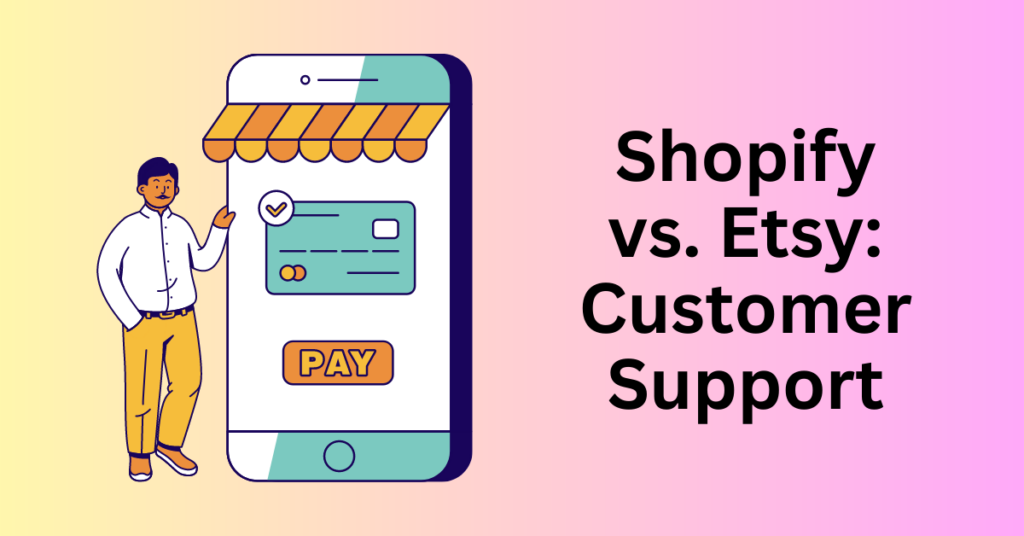
When you are running your business on other platforms, customer support is very important. You would want your problems to be solved promptly to avoid losses in sales and revenue.
Not only that, when setting up and customizing your shop, there might be instances where you face some issues setting it up properly. Or it can be some simple setting mistakes that you can solve to make it look properly. This is where customer support is important.
Shopify provides different customer support channels where you can get solutions for your problems.
- 24/7 phone, chat and email support
- Shopify Help Center
- Shopify experts
- Forums/Community
- eCommerce University online community
Etsy provides different customer support channels where you can get solutions for your problems.
- Phone and email customer support
- Tips in the regular Etsy newsletter
- The Etsy Seller Handbook
- Etsy community forum
Both Etsy and Shopify provide excellent support in terms of the resources available and the community. However, when it comes to 24/7 customer support, Shopify wins in this if you need urgent support.
10. Shopify vs. Etsy: Scalability
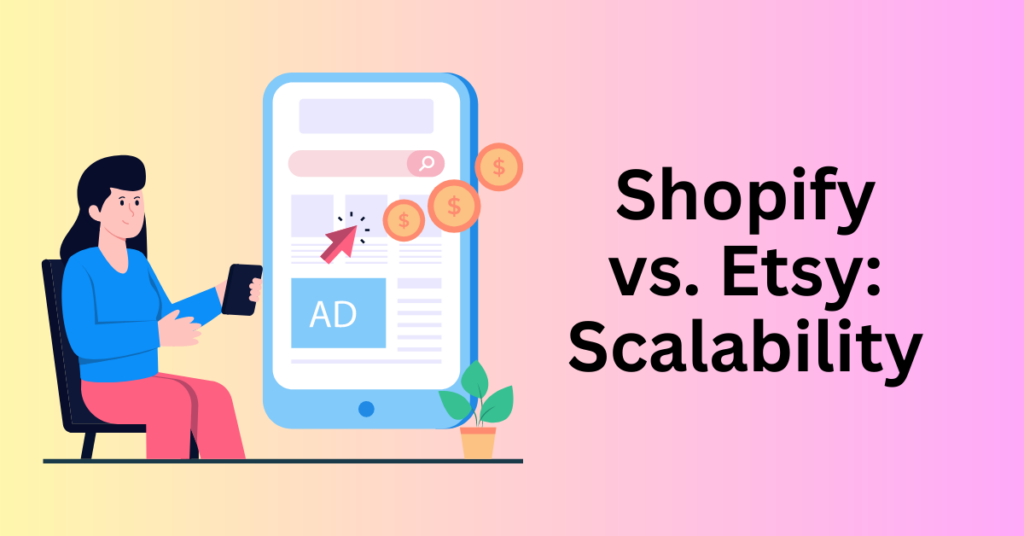
As your business grows, you will need different platforms that can match your business requirements to scale. Etsy is a good platform to start your store quickly. You can leverage the huge active buyers group on Etsy to market and sell your products fast.
Etsy Scalability
With Etsy, you don’t need to worry about the store design and traffic. All you need to do is master Etsy SEO and get ranked on the Etsy search results to get more visibility for your product listings. However, there are some drawbacks to selling on the marketplace when your business grows.
When you are selling on a marketplace, people can see and compare other similar products in the search results. You will be struggling to compete with other sellers as the listing fees and the transaction fee for selling on Etsy will cost you a lot. Not only that, your entire business relies on the Etsy marketplace. And if they block or close down your store, there is nothing much you can do other than appeal for the decision.
Shopify Scalability
Shopify on the other hand is different. You can control the cost of your eCommerce store by subscribing to a different package plan. The higher the plan you subscribe to, the lower the transaction fee.
Not only that, you own the entire eCommerce store where you can design the store to focus on certain products. Your potential customers will see your products only in your store. This will reduce their comparison between similar products from your competitors.
All you need is to optimize your Shopify so that it will persuade them to buy more products from you. And to handle your increasing orders when your business grows, there are different apps to add new features to your Shopify store.
In short, Etsy is a good platform for you to start a new business online and get feedback from the market about your product offerings. And once your business grows, Shopify has the advantage of helping grow your business with the custom store and extra functionality.
Shopify vs. Etsy: The Bottom Line
Etsy is a great marketplace to start your online store. The unique niche of product Etsy focuses on giving it the advantage for niche sellers. With low upfront cost and ease of setup, you can launch your new store and start making sales in no time.
Shopify on the other hand, is an eCommerce store builder platform where you can build a highly customized eCommerce store for your business. You can have different features added to your eCommerce store by installing different apps to it.
No matter which platform you choose, both platforms provide seamless integration with popular print-on-demand suppliers like Printify and Printful. You can upload your design and get the products published on both platforms immediately.
Shopify vs. Etsy Comparison
| Aspect | Shopify | Etsy |
| User Base | Suitable for a wide range of businesses, from small to large. | Primarily used by individual artists and crafters. |
| Product Types | Supports a variety of products beyond handmade items, including print-on-demand (POD). | Strong emphasis on building your brand and online store. |
| Ease of Use | Can be more complex due to the vast range of features. Requires more setup. | Generally user-friendly, with a simpler setup process. |
| Customization | Highly customizable design with themes and apps. More control over branding. | Limited customization options compared to Shopify. |
| Fees | Monthly subscription fee + transaction fees (unless using Shopify Payments). | Listing fee, transaction fee, and payment processing fee. |
| Traffic | POD services are available through third-party apps like Printful, and Printify. | Marketplace nature can bring built-in traffic but still benefits from marketing. |
| SEO and Discoverability | Strong SEO capabilities to optimize your store for search engines. | Relies on Etsy’s internal search algorithm for product discoverability. |
| Community | Limited inherent community, but can integrate social media and forums. | Strong sense of community among Etsy sellers and buyers. |
| Integration | The mobile app is available for store management on the go. | Limited integration options compared to Shopify. |
| Customer Support | Offers customer support but experiences can vary. | Generally responsive customer support focused on the Etsy seller community. |
| Scalability | Scales well with growth, suitable for larger businesses. | More challenging to scale for larger operations. |
| Analytics | Provides basic sales data but is less comprehensive than Shopify. | POD services are available through third-party apps like Printful, and Printify. |
| Print-on-Demand (POD) | POD services are available through third-party apps like Printful, and Printify. | POD services can be integrated, offering a range of products. |
| Verdict | Ideal for businesses wanting full control, branding, and scalability. | Suited for individual artists, crafters, and those seeking built-in traffic. |




